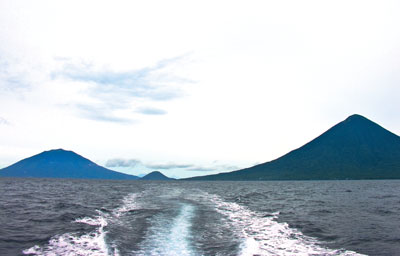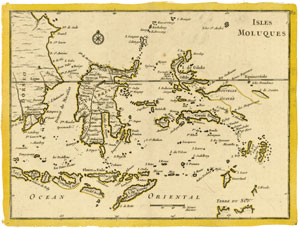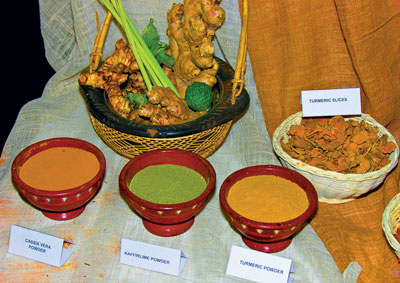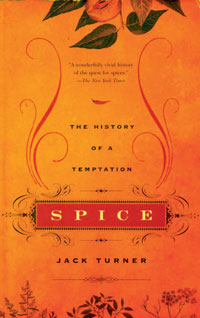 |
THE HISTORY OF SPICES: INTRODUCTION, OR ON DREAMS AND LUXURY"A certain Christopher Columbus, a Genoese, proposed to the Catholic King and Queen, Ferdinand and Isabella, to discover the islands that touch the Indies <…> promising not only to propagate the Christian religion, but also to bring back pearls, spices, and gold beyond anything ever imagined".
Peter Martyr, the confessor of Ferdinand and Isabella of Spain.
De Orbo Novo, 1530
Why Did Columbus Sail to Indonesia?
That Christopher Columbus was searching for India, not America, is known to everyone. But few remember that at the time, the name "India" (or, rather, "Indies") described not the country of the same name as we know it today, but a territory that comprises the south of India and modern Indonesia. As mentioned in the epigraph, many people were striving to go there, and gold was only one of the reasons…

The pursuit of spices – with other treasures being of less importance – led to the establishment of numerous superseding European colonial empires. The earliest was the Sea Empire of the Portuguese, which was followed by those of Spain, Britain and Holland, these three being more stable and vast due to their expansion deeper into the heart of the land.
To possess the Moluccas, also known as the Spice Islands, the Portuguese fought the Spaniards and the English fought the Dutch. More than that, it was for spices that Christopher Columbus had in fact set forth, faring seas and oceans. But he wasn't the only one – there was also Ferdinand Magellan who was the first in the world to undertake an aroundthe-world voyage, and the famous British corsair, Sir Francis Drake, who visited the island of Ternate in 1579 during the second circumnavigation of the globe. Even Willem Barents (after whom the Murmansk Sea was renamed in 1853) and Henry Hudson ventured to the Southern Seas in search of spices, although they both sailed mostly in the North.

A curious fact: the harem of the sultan of Ternate island was so varied and rich in terms of geographic varieties of its concubines that even Sir Francis Drake, this seasoned traveller, found it amazing. Concubines from distant lands cost a fortune, so only a rich ruler could afford them. Ternate's sultan was rich indeed – thanks to the cloves in his possession. (Even the ancient Romans paid a price for this spice that was 100 times higher than what it cost in India.) Sir Francis Drake had Spanish spice-loaded galleons dealt with in his own notorious way – robbing and sinking – on so many occasions that the London-based envoy of His Catholic Majesty, the King of Spain, demanded the head of the insolent corsair. Instead, he was knighted by the British monarchs.
It is not by chance that the European penetration into Indonesia started from the native land of the clove: Ternate and Tidore, two twin-like yet rival islands separated by a kilometre-wide sea channel.
Nowadays, when the clove may be bought at any decent food shop, it's hard to believe that this plant once grew only on five islets, which today are part of Indonesia's province called the North Moluccas. Through these Spice Islands runs a border of sorts: the Wallace Line (named after the famous 19th-century British naturalist) that divides the flora and fauna of Asia from those of Australia. Thus, these islands are home to many endemic species of animals and vegetation, not found anywhere else in the world. Some of these unique plants have been used worldwide as medicine or for other applications for millennia.
Spice Means Special

A handful of the presumably most ancient documented cloves were discovered in a ceramic vase (dated most certainly to the 18th century B.C.) on the banks of the Euphrates. I'd like to emphasise the following once again as, in our times of globalisation, it is quite difficult to fathom: apart from the North Moluccas, the clove did not grow anywhere else in the world, so those found at the Euphrates simply must have been from there. Any other cloves just didn't exist back then. This means that the cloves must have been shipped from the Spice Islands to Central Asia as early as 4,000 years ago.
Spices were used for the embalming of the dead in Ancient Egypt starting from the beginning of the 3rd century B.C. Herodotus, who travelled to Egypt in the 5th century, described three categories of embalming, the highest of which – and, naturally, the most expensive – involved the application of various spices. He did not know their names and mentioned only cassia, a cinnamon-like spice (Cinnamomum aromaticum), which initially grew only in China, but by the time of Herodotus had already spread around Southeast Asia.
In ancient China, in the 3rd century B.C. to be exact, the clove was nicknamed "bird's tongue", as all officials were obliged to chew it at audiences with the Emperor in order not to insult the Son of the Heavens by a foul smell coming from their mouths. Later, it was discovered that cloves helped to mitigate toothache. During the Tang dynasty (618-907), which is considered to be the period when China was at the height of its power and much ahead of all other countries in the world in terms of development, cloves were used to exorcise evil spirits.
In the ancient world and during the Middles Ages, spices were valued not for their specific flavours and scents, which are the reasons we buy them today. It was much simpler: in the past, spices were used as natural preservatives that allowed food such as salted beef to remain edible for much longer than usual during long sea voyages. Thus, put in modern terms, spices were strategic goods. Besides, they were believed – not without grounds – to possess medicinal properties.
But, most importantly, spices were a luxury that only very few, the creme de la creme of society, could afford. They were both status and symbol. One of the novels by Miguel de Cervantes is called Quixaire, Princess of the Moluccas in honour of the clove. While in the sarcophagus of a certain 6th-century Merovingian, two flowers of the clove tree were found in a small golden box. It is clear that they had been put there not to repel foul smells but rather because it was comme il faut, as was the case of the rich and powerful.
In short, spices were special. Something special for the special. Something distinguished for the distinguished.
Heady Remedies
Spices were a dream. One of the versions of the 13thcentury Irish poem The Land of Cockayne mentioned:
The larks, already cooked,
Fly down to men's mouths,
Seasoned in the pot most excellently,
Powdered with cloves and cinnamon.
Today, we fail to fathom what role spices had played in the lives of people from the ancient and medieval eras. In order to understand, we'd have to compare it to something, to find a modern-day analogue, which, alas, simply does not exist.
Spices were used to summon gods, exorcise demons, heal malaises and ward off epidemics; they were much more efficient tender than gold, even for international deals.

And, of course, they were offered as bribes, which was practiced in the courts of France and derided by Racine and Moliere.
In the Middles Ages, clove and cinnamon extracts were used to ease the suffering of those who had succumbed to the plague. Additionally, the Venerable Bede (c. 673-735) wrote about the medicinal properties of the clove and pepper. However, he was only perpetuating the knowledge of Galen, one of the most celebrated doctors and naturalists of Antiquity. Later, Franciscan monk Roger Bacon (c. 1214-1294) suggested using a mixture of dried ground adder, clove, nutmeg and mace as an age-fighting measure. The notions of spices and remedies were identical, so that even today in the Italian language, one of the words denoting a pharmacist is "speziale".
Do you happen to know the full title of Jacob I, British King I (1566- 1625)? "The King of England, Scotland, Ireland, France, Puloway and Puloroon"! The latter two are tiny islets in the Moluccas in the Banda Sea, where Great Britain had managed to establish its presence in the 16th century, albeit fleetingly. That is suffice to say.
It was the island of Puloroon that took part in the most successful – according to my own taste – twists of history. During the second Anglo-Dutch war, after the Dutch fleet had defeated the British and penetrated the Thames threatening London, the English had to sign the extremely humiliating Treaty of Breda on 31 July 1667. According to its terms, Holland appropriated the island of Puloroon, as well as Surinam in South America. In order for it not to look like daylight robbery, London was thrown a bone – New Amsterdam in America, today's Manhattan…
P.S. This new series of articles about spices owes its birth to the book Spice by Jack Turner that managed to make its way into my hands. I highly recommend it!
Mikhail Tsyganov, a RIA Novosti correspondent in Bali, Indonesia, exclusively for 103rd Meridian East
|
 +65 6696 7068
+65 6696 7068
 info@meridian103.com
info@meridian103.com
 PDA
PDA
 +65 6696 7068
+65 6696 7068
 info@meridian103.com
info@meridian103.com
 PDA
PDA

ninoemmanuel49@gmail.com
Thanks ..
Mr Nino, 2016-05-24